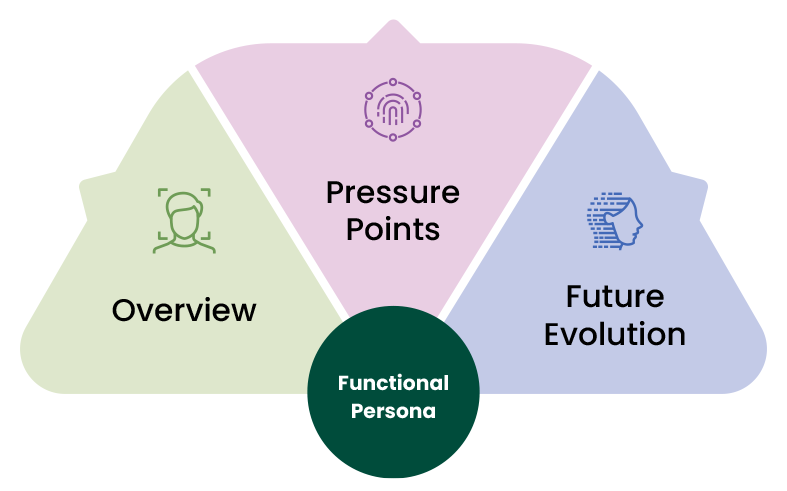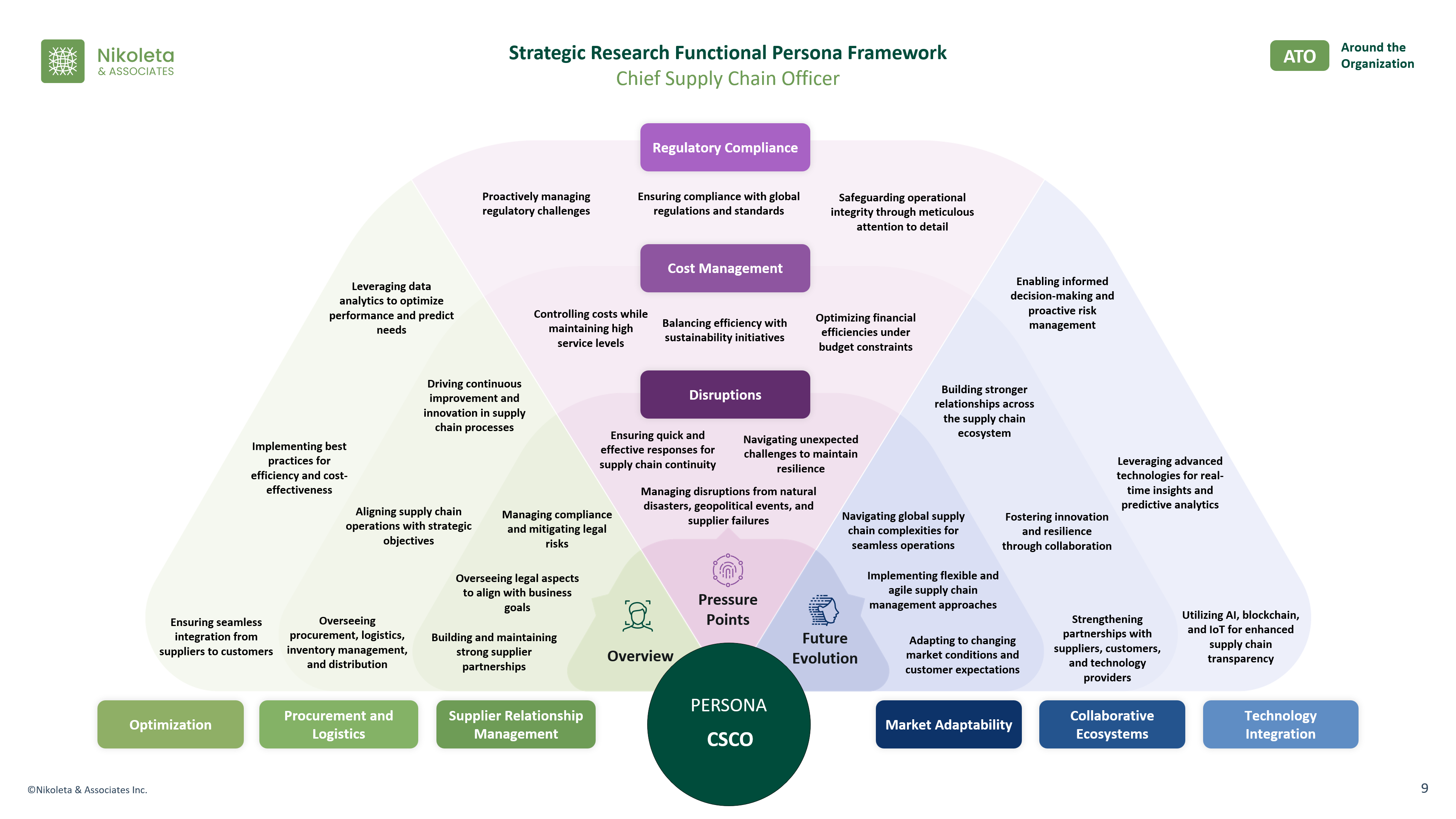Around the Organization (ATO)
Frameworks for Functional Role Clarity and Strategic Growth
Chief Supply Chain Officer
(CSCO)
Persona Framework

Welcome to the Chief Supply Chain Officer (CSCO) segment of our Around the Organization (ATO) practice—an area in our Consulting and Capability function dedicated to exploring and capturing the essence of modern organizational roles. Dive into the unique characteristics, challenges, and future evolution of the CSCO role.
Learn how CSCOs optimize supply chain operations, reduce costs, and improve efficiency. Discover the critical role CSCOs play in managing inventory, logistics, and procurement to ensure a seamless flow of goods and services.
The Framework

The overview takes a deeper dive into the functional persona by integrating a holistic perspective. This section highlights the unique characteristics, capabilities, and the central role that the functional persona plays within the organizational ecosystem.
The pressure points highlights the challenges and obstacles that individuals within the functional persona may encounter. The importance of the pressure points is aimed to provide guidance towards the overall wellbeing of the functional persona.
The future evolution considers the ever-evolving landscape of market trends and how they intersect with the trajectory of the functional persona. It does not only forecast, but also aims to prepare and shape the functional persona to the change.
Overview
The Chief Supply Chain Officer (CSCO) is an expert in optimizing and managing the end-to-end supply chain processes, ensuring seamless integration from suppliers to customers.
The CSCO oversees the entire supply chain function, from procurement and logistics to inventory management and distribution. They ensure that the supply chain operations align with the strategic objectives of the organization, focusing on efficiency, cost-effectiveness, and sustainability. This role requires a deep understanding of market dynamics, supplier relationships, and technological advancements to drive continuous improvement and innovation within the supply chain. The CSCO must collaborate closely with other executive leaders to integrate supply chain strategies with overall business goals. They are responsible for implementing best practices and leveraging data analytics to optimize performance and predict future needs. By fostering strong relationships with suppliers and partners, the CSCO ensures a resilient and agile supply chain capable of adapting to market fluctuations. Ultimately, the CSCO’s role is pivotal in maintaining a competitive edge through strategic and operational excellence.
Role Attributes
Supplier Relationship Management: Building and maintaining strong partnerships with key suppliers
Sustainability Initiatives: Incorporating sustainable practices into supply chain operations
Risk Management: Identifying and mitigating supply chain risks to ensure business continuity
Pressure Points
The CSCO is presented with pressure points that are complex and multidimensional, presenting challenges that drive organizational efficiency and competitive advantage.
The CSCO must navigate various challenges, including supply chain disruptions, cost pressures, and regulatory compliance. Managing unexpected disruptions such as natural disasters, geopolitical events, or supplier failures requires quick and effective responses to maintain supply chain continuity. Balancing the need for efficiency with sustainability initiatives adds another layer of complexity, as the CSCO must integrate environmentally and socially responsible practices without compromising performance. Additionally, the role requires effective collaboration with internal stakeholders and external partners to ensure seamless operations. The CSCO must also stay ahead of market trends and technological innovations to maintain a competitive edge and drive continuous improvement. Ensuring compliance with a myriad of global regulations and standards is another significant challenge that requires meticulous attention to detail and proactive management. Limited resources and tight budgets often necessitate prioritizing projects that deliver the most value while still advancing strategic objectives.
Common Pressure Points
Managing unexpected disruptions such as natural disasters, geopolitical events, or supplier failures to ensure supply chain resilience
Controlling costs while maintaining high service levels to optimize financial efficiencies
Ensuring compliance with global regulations and standards to safeguard operational integrity
Facilitating effective communication and cooperation among internal and external stakeholders to navigate complex relationships.
Future Evolution
Embracing evolving markets and technologies, the CSCO’s role will expand to adapt to new challenges and opportunities.
The CSCO will increasingly focus on leveraging advanced technologies such as AI, blockchain, and IoT to enhance supply chain transparency and efficiency. These technologies will provide real-time insights and predictive analytics, allowing for more informed decision-making and proactive risk management. Sustainability will become a core aspect of supply chain strategies, with a greater emphasis on ethical sourcing, reducing carbon footprints, and promoting circular economy practices. Collaboration across the supply chain ecosystem will be crucial, requiring the CSCO to build stronger partnerships with suppliers, customers, and technology providers to foster innovation and resilience. The ability to adapt to changing market conditions and customer expectations will be vital for long-term success, necessitating a flexible and agile approach to supply chain management. The CSCO will also play a key role in developing and implementing strategies to navigate the complexities of global supply chains and ensure seamless operations across diverse regions. Building a resilient organizational framework will be essential to withstand disruptions and capitalize on new opportunities.
Role Evolution Aspects
Integrating technology by utilizing AI, blockchain, and IoT for enhanced supply chain management
Strengthening partnerships across the supply chain through collaborative ecosystems
Prioritizing ethical sourcing and reducing environmental impact by having a sustainability focus
The Role of Change in the
CSCO Functional Persona
The CSCO plays a role in steering the organization’s supply chain strategy, ensuring resilient and adaptable processes that can efficiently respond to evolving market conditions and disruptions. This crucial position requires the ability to foresee and strategically tackle supply chain obstacles, integrating them seamlessly with the company’s overall goals. Beyond addressing immediate challenges, the CSCO develops a supply chain infrastructure that equips the organization to navigate future market dynamics. By fostering a culture that emphasizes efficiency and continuous innovation, the CSCO instills principles of proactive risk management and continuous improvement throughout the organization.
For CSCOs, embracing change is essential to reinforce organizational resilience, enhance supply chain efficiency, and cultivate a culture of innovation and proactive risk management.
How CSCOs Can Be Open to and Maintain Change
Implement green practices
Minimize environmental impact and promote responsible sourcing
Strengthen partner collaboration
Build a flexible and resilient supply chain network
Update crisis management plans
Ensure swift and effective responses to disruptions





















